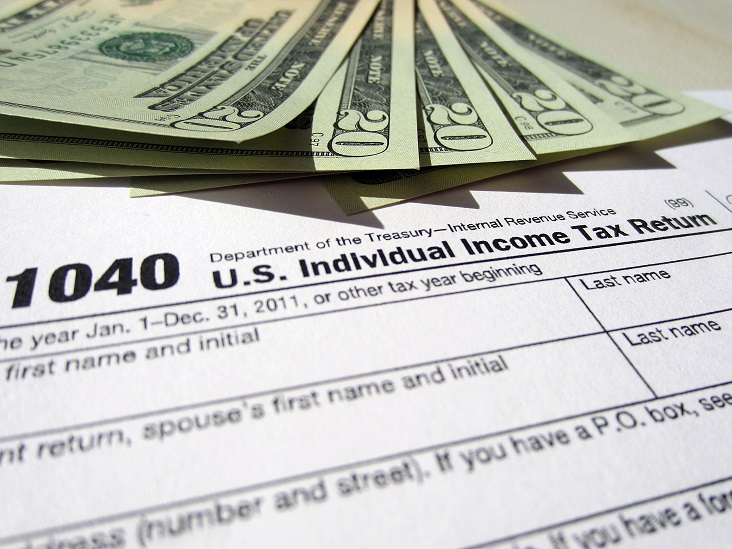
Moving can be extremely stressful. Between the planning, the packing and the actual move, it’s enough to make anyone swear they’ll never move again.
Of course, that’s not likely the case; you’ll probably move several times throughout your life. During the upcoming months, a great way to alleviate that stress is to use your tax return money to make the process smoother and to help you with the undertaking.
Here are five easy ways to accomplish that feat.
Make Some Minor Repairs at Your Current Residence
Whether you’re renting an apartment or selling your house, there’s bound to be some damage that has been caused during your residence. In some cases, it could be minor, such as scuff marks, or something a bit more major, like a hole in the drywall from that one wild party. Regardless of the size of the damage, you’re going to have to do some home repairs prior to moving out. And you can use your tax return to fund these projects.
For renters, you may think it’s no big deal to fix up your former residence. After all, that’s what your security deposit is for, right? But instead of losing that deposit and burning bridges with your property manager, take the time to fill in any holes in the wall, replace any broken blinds or window panes, and remove any scuff marks or carpet stains.
If you’re a homeowner, you probably have a little bit more work to do. For starters, you’ll probably want to repaint the house in neutral colors and make minor repairs to key features in your kitchen and bathroom, like:
-New backsplashes or tiles
-Updated cabinet hardware and towel holders
-Replace faucets and showerheads
-Remove any outdated décor, such as wallpaper
You’ll also want to improve the curb appeal of your home by investing in landscaping, replacing your mailbox, repainting entryways, staining/repairing decks/patios/fences and power washing the outside of your home.
You can use your tax return to purchase any home repair materials, such as paint or spackling paste, to rent equipment like a carpet steamer or power washer, or to hire a handyman if you’re not a DIY type of individual.

Start an Emergency Fund
I know. This isn’t exciting. In fact, it’s boring. But using your tax return to build an emergency fund is one of the best ways to be prepared when deciding to move. For example, you or your spouse just received a can’t-beat job opportunity. The problem? It starts in two weeks. Moving isn’t cheap — especially in such a short timeframe. If you had a rainy day fund, you could hire movers to get you out and settled in a short amount of time.
An emergency fund could also come in handy whenever a major expense occurs, such as a major appliance breaking down, fixing a leaky roof or calling a plumber or electrician. One final perk of having a safety net is that if you ever lost your job, you could live off the money temporarily. Again, moving isn’t cheap, and if you were forced to relocate, being unemployed isn’t the best scenario.
There’s no magic number for how much you need in your emergency fund, but having at least $1,000 saved is a great place to start.
Catch Up on Bills
When thinking about a move, you need to make sure your credit is in great shape. After getting a copy of your credit score for free, you will want to take steps to improve that three-digit number! The first step is always to catch up on any outstanding balances and bills. Credit and payment history is 35% of your overall score, so catching up accounts will make quick work of improving your score.
![]()

Pay for Moving Expenses
Ask your parents, siblings and friends how much it cost them to move. Even if the price varies, there will be one consensus: It cost more than they anticipated.
Some of these expenses were discussed earlier, such as repairing your current residence, hiring movers and purchasing items for your home or apartment. But you can’t forget about other expenses like:
-Storage and lodging fees if you’re in between residences.
-Security or pet deposits and application fees.
-The initial cost of setting up new electric, gas, Internet and cable services.
-If you’re selling a home, there will be closing costs and your real estate agent’s commission.
-The need to purchase boxes, packing tape and markers.
Even if you cut down your moving expenses, such as getting hand-me-downs and asking your friends or family to help, you’re still going to have to at least order a pizza for their assistance.
Overall, however, you just won’t be able to escape the cost of moving. And that nice little tax return can help you ease this financial burden.
Don’t Forget to Deduct Moving Expenses Next Year
Did you know that you can deduct your moving expenses? Keep that in mind when filing your taxes next year if you meet the following IRS requirements:
-Your move closely relates to the start of work
-You meet the distance test
-You meet the time test
If you meet all three requirements, you can actually save a bundle just because you moved.
Leveraging Your Tax Return to Help You Move
Apartment Living

Recommended Articles
Apartment Living
5 Min. Read
How to Search for Properties on ForRent.com
Searching for the perfect apartment or rental home? Well, you’ve come to the right place! Here at ForRent.com, we have an extensive selection of online listings just waiting to be explored. Whether you want…
Apartment Living
8 Min. Read
Apartment Safety 101
One of the biggest draws to apartment living is safety. Most apartment buildings have helpful security features like gated entrances, surveillance cameras, and on-site management. However, that doesn’t mean tenants shouldn’t take their own…
Apartment Living
7 Min. Read
How to Create a Beautiful Patio or Balcony Space
Renting an apartment often means letting go of the luxury of a big, private yard. However, just because you’re in an apartment doesn’t mean you can’t have your own outdoor space. Many modern condos…
Apartment Living
7 Min. Read
The Pros and Cons of Renting a House
There are many reasons why you might choose to rent a house. Whether you want more yard space for your pet, privacy from neighbors, or the simple luxury of getting packages delivered to your…
